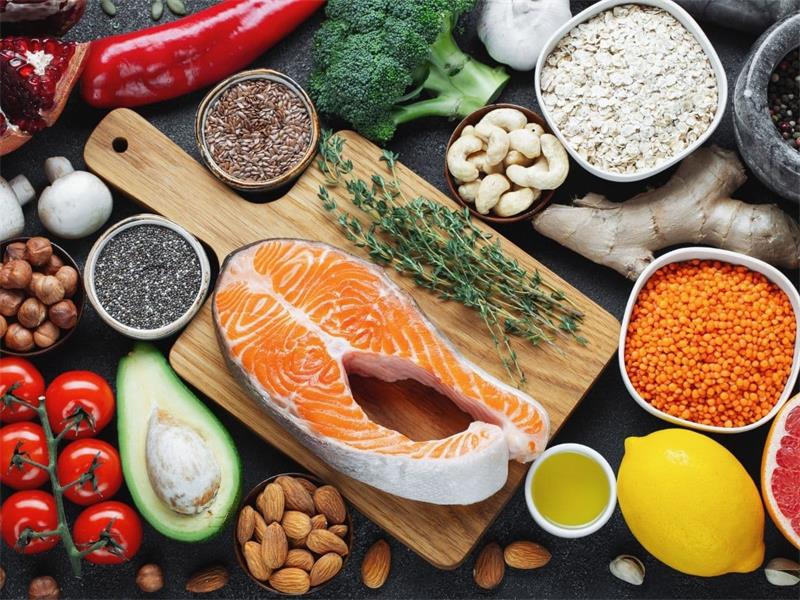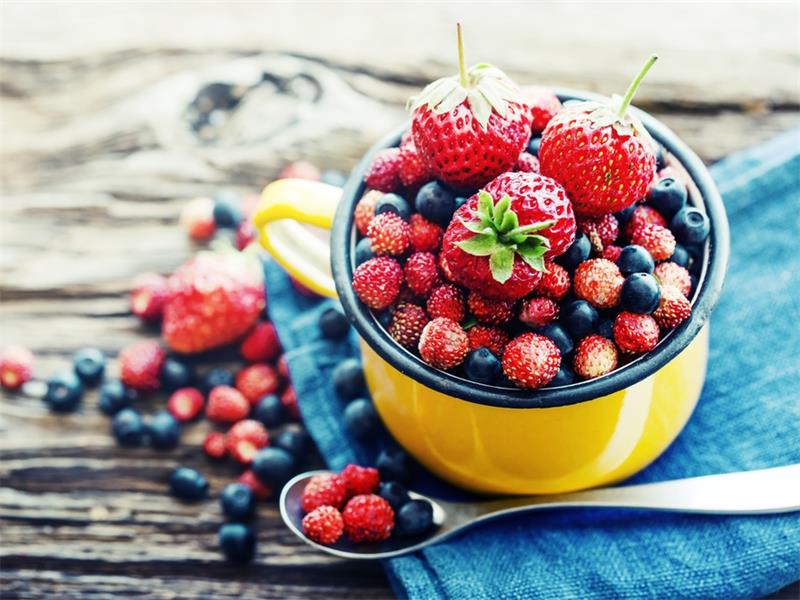Contents
Why a Healthy Diet is Important for Overall Health and Well-being
Most of us have heard the saying “You are what you eat.” But have you ever stopped to think about how true that statement really is? The food we consume on a daily basis plays a significant role in our overall health and well-being.
Our bodies require essential nutrients, vitamins, and minerals to function properly. And by consuming a healthy diet filled with nutrient-rich foods, we can help prevent chronic diseases like heart disease, cancer, and diabetes.
But it’s not just about preventing disease – a healthy diet can also improve our mood, energy levels, and mental clarity. When we eat well, our bodies feel nourished and energized.
On the other hand, when we consume unhealthy foods like processed snacks or sugary drinks, our bodies may experience fatigue or sluggishness. So what does a healthy diet look like?
It’s all about balance and moderation. We should aim to consume plenty of fruits and vegetables (especially leafy greens), lean proteins like fish or chicken, whole grains like quinoa or brown rice, nuts & seeds (such as almonds or chia), and healthy fats like avocado or olive oil.
By making small changes to our diets – such as swapping out sugary drinks for water or incorporating more veggies into meals – we can make significant improvements in our overall health. So let’s explore some of the top 10 healthiest foods that you should be eating every day to fuel your body with the essential nutrients it needs!
The Top 10 Healthiest Foods You Should Be Eating Every Day
Eating a well-balanced diet is essential for maintaining good health. The food we eat provides us with the energy and nutrients our bodies need to function properly.
However, not all foods are created equal. Some foods are more nutrient-dense than others and can provide us with a range of essential vitamins, minerals, and antioxidants that are vital for our overall health and well-being.
Berries: Superfoods Packed with Antioxidants
Berries such as blueberries, raspberries, and strawberries top the list of the healthiest foods you should be eating every day. These superfoods pack a powerful punch when it comes to antioxidants. Antioxidants work by neutralizing free radicals in the body that can damage cells and contribute to chronic disease.
Blueberries are especially high in antioxidants called anthocyanins which have been linked to improved cognitive function, reduced inflammation, and lower risk of heart disease. Raspberries contain ellagic acid which has been shown to have anticancer properties while strawberries are packed with vitamin C which helps boost immunity.
Leafy Greens: Nutrient Powerhouses
Eating leafy greens like kale, spinach, and collard greens every day is an excellent way to ensure you’re getting enough of essential nutrients like folate, calcium, iron, and vitamins A & C. Leafy greens are also rich in fiber which helps promote digestive health by keeping things moving smoothly through your system. Kale specifically is one of the most nutrient-dense foods on the planet! It is packed with vitamin K which plays a critical role in blood clotting as well as other vital nutrients such as vitamin A & C that help protect against cell damage from free radicals.
Nuts & Seeds: Healthy Fats for a Healthy Heart
Consuming nuts and seeds such as almonds, chia seeds, and flaxseeds on a daily basis can be very beneficial for your heart health. These foods are high in healthy fats like omega-3 fatty acids which can help lower cholesterol levels and reduce inflammation in the body.
Almonds are an excellent source of vitamin E which is an antioxidant that helps protect against cell damage while chia seeds are packed with fiber which can help regulate blood sugar levels. Flaxseeds contain lignans which have been shown to have estrogen-like properties that may help reduce the risk of breast cancer.
Leafy Greens: The Nutrient-Packed Powerhouses
When it comes to healthy eating, leafy greens should be at the top of your list. These nutrient-packed powerhouses are a must-have in any diet.
Whether you prefer kale, spinach, or collard greens, these greens are not only delicious but also loaded with essential nutrients. One of the key benefits of consuming leafy greens is their ability to improve digestion.
These vegetables are high in fiber, which helps to keep things moving in your digestive system and prevent constipation. Not only that, but they also contain enzymes that can aid in the breakdown of food and improve nutrient absorption.
Leafy greens are also known for their immune-boosting properties. They contain a variety of vitamins and minerals that can help support a healthy immune system.
For example, spinach is high in vitamin C, which is important for fighting off infections and boosting immunity. Additionally, kale contains beta-carotene and vitamin E – two powerful antioxidants that can help protect cells from damage.
Consuming leafy greens may also help reduce inflammation in the body. Many chronic diseases like cancer and heart disease are linked to chronic inflammation within the body.
Leafy greens contain compounds like flavonoids and carotenoids that have anti-inflammatory properties. Incorporating these vegetables into your diet regularly can help reduce inflammation and lower your risk for these diseases.
Leafy greens should be a staple in any healthy diet plan due to their numerous health benefits like improved digestion, boosted immunity levels as well as reduced inflammation throughout the body all while being delicious! So don’t hesitate to add them to your salads or smoothies for an added boost!
Berries: The Antioxidant Powerhouses
Berries are a group of small, juicy fruits that come in a variety of colors and flavors. Blueberries, strawberries, and raspberries are among the most popular types of berries.
These tiny fruits pack a nutritional punch, being rich in vitamins, minerals, fiber, and antioxidants. In this section, we will take a closer look at the benefits of consuming berries regularly.
Types of Berries
There are many different types of berries available all around the world. Popular varieties include blueberries, strawberries, raspberries, blackberries, cranberries, and goji berries.
Each type has its own unique taste and nutritional profile. Blueberries are one of the richest sources of antioxidants among all fruit varieties.
They contain high levels of vitamin C and K as well as fiber that can help reduce inflammation levels in the body. Strawberries are an excellent source of vitamin C which can help boost immunity levels.
They also contain several other nutrients like folate that can help protect against heart disease. Raspberries have a high fiber content which can aid in digestion while its natural sugars provide energy to keep you feeling fuller for longer periods.
The Benefits of Antioxidants
One key reason why berries are considered one of the healthiest foods on earth is that they’re packed with antioxidant compounds like anthocyanins and flavonoids. These antioxidants work by neutralizing free radicals in your body which can cause cellular damage leading to chronic illnesses like cancer and heart disease. Studies have shown that consuming berries rich in flavonoids regularly may also help improve cognitive function and memory retention.
, dietary guidelines recommend that individuals should aim to consume at least 1-2 servings of berries daily as part of their diet for overall health benefits. Including these tiny yet powerful superfoods in your diet can deliver huge health benefits in the long run.
Nuts & Seeds: The Health Nut’s Best Friend
Nuts and seeds are a health enthusiast’s best friend, thanks to their abundance of healthy fats, fiber, vitamins, and minerals. They’re a great addition to any diet looking to promote heart health and reduce inflammation. Consider adding some of the following nuts and seeds into your daily routine for optimum results:
Almonds
Almonds are an incredible source of Vitamin E – just one ounce contains about 37% of the recommended daily intake! They also have high levels of healthy monounsaturated fats that can help lower bad cholesterol levels. Almonds are rich in magnesium which can help regulate blood sugar levels and maintain healthy bones.
Chia Seeds
Chia seeds may be tiny but they pack a powerful punch when it comes to nutrition. Just one tablespoon contains 5 grams of fiber which is essential for a healthy digestive system. These small seeds are also loaded with omega-3 fatty acids that can help support brain health and reduce inflammation.
Flaxseeds
Flaxseeds are high in lignans which have been shown to help fight against breast cancer. They’re packed with fiber, protein, magnesium, manganese, thiamine (vitamin B1), zinc and essential fatty acids (EFAs); specifically alpha-linoleic acid (ALA), an omega-3 fatty acid that supports normal growth and development as well as better heart health.
Incorporating nuts and seeds into your diet is easy – you can sprinkle them over salads or yogurt or add them to your smoothies for a quick nutritional boost. There’s no better way to start off your morning than with some chia seed pudding or almond butter on toast!
Whole Grains
The Versatility of Whole Grains
When it comes to healthy eating, you can’t go wrong with whole grains. These nutrition powerhouses are packed with vitamins, minerals, and fiber, making them an essential part of any healthy diet.
Whole grains come in all shapes and sizes, from nutty quinoa to chewy brown rice to hearty oats. The best part?
There are countless ways to enjoy them! One of the great things about whole grains is that they’re incredibly versatile.
You can use them in everything from salads and soups to breakfast bowls and stir-fries. They add a nutty flavor and a satisfying chewiness to any dish, making them perfect for adding nutrients and texture without adding unnecessary calories.
The Fiber Connection
One of the biggest benefits of eating whole grains is that they’re packed with fiber. Fiber is an essential nutrient that helps regulate digestion, keeps you feeling full longer, and can even help lower cholesterol levels.
Most Americans don’t get enough fiber in their diets, which can lead to constipation, weight gain, and other health problems. But by incorporating more whole grains into your meals, you can significantly increase your fiber intake.
Regulating Blood Sugar Levels
Another benefit of eating whole grains is that they can help regulate blood sugar levels. Unlike refined carbohydrates like white bread or pasta which cause spikes in blood sugar levels followed by crashes that leave you feeling tired and hungry soon after consuming them; the carbohydrates found in whole grains release slowly & steadily so your body doesn’t experience these fluctuations leading to hunger pangs or sugar cravings between meals. Next time you’re at the grocery store or planning your meals for the week ahead; make sure to include some delicious whole grains such as quinoa, brown rice or oats in your diet plan!
Fish & Seafood
Fish and seafood are some of the healthiest foods you can consume. They are rich in protein, omega-3 fatty acids, and essential vitamins and minerals.
Consuming fish and seafood regularly can help improve brain function, protect against heart disease, and reduce inflammation. Salmon is one of the most popular types of fish that people love to eat due to its delicious taste.
It is also high in omega-3 fatty acids which can help prevent heart disease. Other types of fish like tuna, herring, sardines, and mackerel are also great sources of omega-3s.
Seafood such as shrimp, crab, and lobster is low in calories but high in protein content making it an excellent choice for people who want to maintain a healthy weight. Eating seafood at least twice a week has been linked to reduced risk of heart disease and stroke.
Conclusion
Consuming a diet full of nutrient-rich foods can go a long way toward improving overall health and well-being. By incorporating leafy greens like kale or spinach into your meals or snacking on berries throughout the day you can give your body the essential vitamins it needs to function optimally.
And don’t forget about nuts & seeds which provide both fiber and healthy fats that contribute towards reducing inflammation throughout your body. Whole grains such as quinoa or oats provide energy while regulating blood sugar levels; with their high-fiber content keeping you feeling fuller for longer periods throughout the day.
Fish & seafood are some great sources of protein along with being packed with omega-3 fatty acids that work wonders for our brain functions. So go ahead – start stocking up on these top 10 healthiest foods today!












